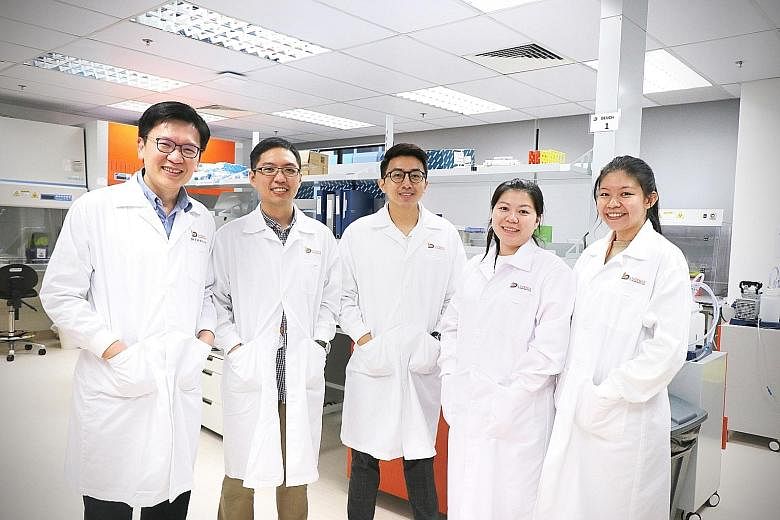Local genomic medicine company Lucence announced last week that it has received US$20 million (S$27 million) in initial funding after it invented a non-invasive test for late-stage cancer detection.
The firm's founder and chief executive, Dr Tan Min-Han, said the Series A funding will help Lucence expand its presence overseas as well as fund further research to help detect early-stage cancer.
The company is a spin-off from the Institute of Bioengineering and Nanotechnology, a unit under the Agency for Science, Technology and Research.
Dr Tan, 45, said Lucence conducts and processes the results of non-invasive tests on late-stage cancer patients using the company's patented sequencing test known as LiquidHallmark.
The test can detect both cancer-related gene mutations and cancer-causing viruses.
It utilises a method known as liquid biopsy, where tests are conducted on a sample of blood to find cancer cells or pieces of DNA from tumours that may be circulating in the blood.
Dr Tan said this method is an alternative to tissue biopsy, an invasive procedure where a sample of tissue is taken from an organ for testing.
Tissue biopsies typically require an overnight stay in the hospital, and a wait of two to three weeks for results. It is also more expensive and carries higher risks, such as organ damage and infection, said Dr Tan.
Lucence's method does not require a hospital stay, has lower risks, takes only one to two days for results to return, and costs about one-fifth that of a tissue biopsy.
There are obstacles to detecting cancer using liquid biopsy.
"The DNA fragments from a cancer cell circulating in the blood are usually present amid a sea of fragments of normal DNA.
"There's a needle-in-haystack sort of problem, where there's a need to amplify and capture the signal of the mutant DNA," said Dr Tan.
This is where Lucence's technology comes in. Invented last year by Dr Tan and his chief technology officer, Dr Yukti Choudhury, it focuses on selected DNA fragments and multiplies them using a chemical process, amplifying the signal they give off. This makes it easier to detect mutant DNA.
"It's like a chemical photocopying machine," said Dr Tan.
He added that the test has been used on more than 1,000 patients in Asia over the past year or so, with 99.9 per cent accuracy.
For late-stage cancers, Lucence looks at 14 cancers, including lung, breast, colorectal, pancreatic, liver, and nasopharyngeal cancers.
Late-stage cancers are usually regarded as metastatic.
The LiquidHallmark test is available at the National Cancer Centre Singapore as well as at private oncology clinics here.
In September, Lucence's Singapore laboratory became the first in South-east Asia to receive a United States federal certification.
Dr Tan said this, together with the Series A funding, which was led by Malaysian-Singaporean private healthcare group IHH Healthcare, will allow the company to build a lab in the US Bay area.
Lucence already has offices in Hong Kong, Suzhou and San Francisco, and is exploring building labs in mainland China and Hong Kong.
"This is an example of how great technology that's invented in Singapore can be grown globally," he said.
Dr Tan also hopes to use the funding to conduct further research on how LiquidHallmark, which is currently used for only late-stage cancer patients, can be applied to early-stage cancer patients as well.
He said: "I believe liquid biopsy will be a key tool to detecting cancer early, when it's curable."


